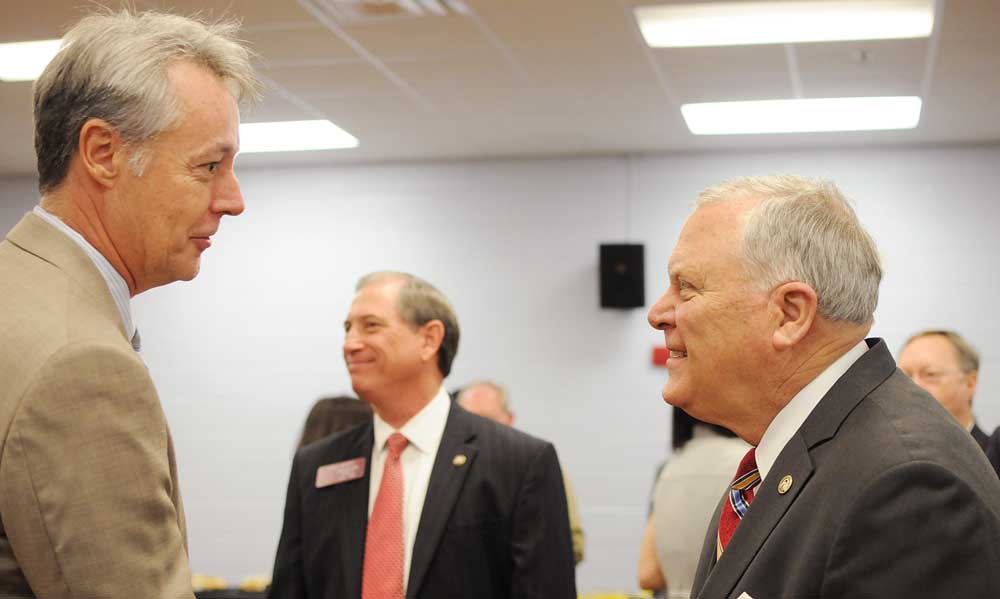State faces skilled worker gap
Published 11:05 pm Monday, April 21, 2014

- Gov. Nathan Deal speaks with Scott Gladish with the Georgia Partnership for TeleHealth on Monday at the Northwest Georgia College and Career Academy. (Misty Watson/The Daily Citizen)
Clay Cooper says HON is producing as many retirees as the company is office chairs.
Trending
“That’s a joke, but it feels that way, and they’re taking their skills with them,” said Cooper, who works for HON, the Iowa-based office furniture company with a plant in Cedartown, during the Governor’s High Demand Career Initiative meeting on Monday at the Northwest Georgia College and Career Academy.
Cooper was one of several business leaders who spoke about problems industry faces in recruiting and retaining skilled workers, and where they see the field headed in the next few years. Several representatives from Georgia’s universities and technical colleges, as well as local school officials, attended to determine what they can do to improve students’ education to better prepare them for the workforce.
As part of the initiative, Gov. Nathan Deal signed the Work Based Learning Act, which renamed the Youth Apprenticeship Program and expanded it. Deal said the expansion includes allowing students 16 years or older participate, helps encourage dual credit for high school and colleges, and helps students transition to higher learning and to the workforce.
There are jobs open in Georgia, Deal said, but there are not enough qualified workers to fill them. The act and the discussions between industry leaders and education leaders are designed to make sure there are qualified workers ready for the jobs open, he said.
“We don’t want to spend all this effort to educate them for them to leave our state,” Deal said. “We want to keep them at home. … We can’t just look at short term — what do you need to do now — but what do you need to do five to 10 years from now. … The best way is to ask businesses what they need.”
Deal said it’s a “tragedy” for a student to spend time and money working on a degree when there are no jobs available in that field when the student graduates.
Trending
The meeting in Dalton is one of three planned across the state.
Several representatives of industry repeated the same thing during the meeting. They need specialized skilled workers: welders, engineers, maintenance workers and computer programmers.
“Having welders is crucial to us,” Cooper said. “We have pretty sophisticated saws and we need people with CNC (computer numerical control) programming experience to operate those. We’re looking at engineers and workers with CNC experience.”
The younger generation is not staying at jobs as long as the retiring generation had, resulting in faster turnover and more money spent training, he said.
Jerry Hendrix, of Mohawk Industries, said the average age of workers for the company is 46.
“It’s so critical to bring young talent in,” he said. “Business today will not be the same as tomorrow. Technology is changing the way we do business.”
He said Mohawk needs workers skilled in robotics, recycling, maintenance, electrical work and machine operators.
“We have to keep that talent and keep them engaged,” Hendrix said.
There is a communication problem between the generation entering the workforce and the generation that makes up management, Hendrix said.
“Sometimes it’s like speaking a different language,” he said. New workers want information in terms of how things will impact them and they like to work socially.
Hank Huckaby, chancellor of the University System of Georgia, said he and other educators will take what they hear from the industries and see what they can do to be successful.
“We’re here to listen,” Huckaby said. “We’ll have a better understanding of what tomorrow will look like.”





